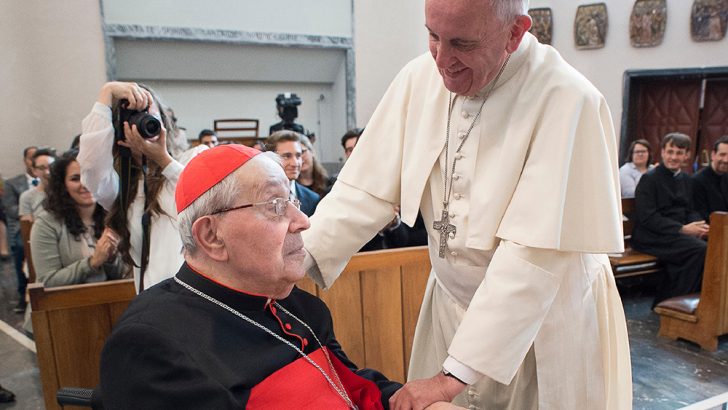Italian cardinal and diplomat dies age 95
Cardinal Achille Silvestrini, former prefect of the Congregation for Eastern Churches and a long-time Vatican diplomat, died at his home in the Vatican on August 29 at the age of 95.
Cardinal Silvestrini served in the diplomatic corps of the Holy See in Rome and abroad for nearly 35 years, before being named prefect of the Supreme Tribunal of the Apostolic Signatura and later prefect of the Congregation for Eastern Churches, where he served until his retirement in 2000. During his diplomatic career, the cardinal played an important role in the negotiations between Italian authorities and the Holy See on the agreement revising the Lateran Treaty in 1984.
He was named as a member of the so-called ‘St Gallen Group’ of about a dozen cardinals who are said to have met to consider and promote candidates ahead of the 2005 and 2013 conclaves.
Cardinal Silvestrini did not vote in the conclaves which elected Pope Benedict XVI and Pope Francis, as he had passed the canonical age of participation when he turned 80 but was widely recognised as a leader among several cardinals in favour of electing a theological reformer.
Love of God can also create hatred, Pope warns
While listening to and obeying God’s word brings healing and comfort to those in need, it also can attract disdain and even hatred from others, Pope Francis said.
Christians are called to proclaim the love of God through their care for the sick and the needy, like St Peter and the other disciples who went to various cities bringing spiritual and physical healing to many, the Pope said during his weekly general audience in St Peter’s Square.
While Peter’s healing of the sick also “aroused the hatred of the Sadducees”, the Pope said, his response to them to “obey God instead of men” is the “key to Christian life”.
“Let us also ask the Holy Spirit for the strength to not be frightened in the face of those who command us to be silent, who slander us and even threaten our lives,” he said. “Let us ask him to strengthen us inwardly to be certain of the loving and comforting presence of the Lord at our side.”
Benedict responds to abuse crisis essay criticisms
Pope emeritus Benedict XVI has responded to criticism of his essay on the abuse crisis, saying many negative reactions have confirmed his central thesis that apostasy and alienation from the Faith are at the heart of the crisis – by not even mentioning God in their critique of his essay.
In a brief statement in reaction to such criticism published in German magazine Herder Korrespondenz the former Pontiff pointed to a “general deficit” in the reactions to his essay, saying that many critical responses missed the very point he was making.
Benedict’s essay described the impact of the sexual revolution as well as – independent from it – a collapse of moral theology in the 1960’s, before suggesting how the Church should respond by recognising that “only obedience and love for our Lord Jesus Christ can point the way”.
Reactions to the essay have been particularly strong in Germany. Benedict cited the example of a critical response to his essay from a German professor of history, pointing out that while the professor’s response was four pages long, “the word God does not appear [once]”, even though apostasy was the central claim of the scholar’s argument.


 Pope Francis greets Cardinal Achille Silvestrini in this June file photo.
Photo: CNS
Pope Francis greets Cardinal Achille Silvestrini in this June file photo.
Photo: CNS 